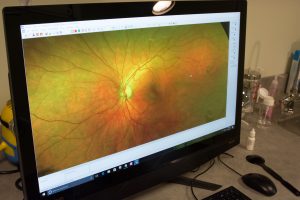Comprehensive Adult Eye Exams:
 The ultimate goal of a complete eye exam is to ensure that not only your vision, but a thorough medical evaluation of the health of your eyes is assessed by our experienced eye doctor. There are many eye diseases that can affect your eyes even if you initially seem to have good vision. It’s critical that the diagnosis, treatment, and proper management of these often symptom-free conditions are performed as soon as possible.
The ultimate goal of a complete eye exam is to ensure that not only your vision, but a thorough medical evaluation of the health of your eyes is assessed by our experienced eye doctor. There are many eye diseases that can affect your eyes even if you initially seem to have good vision. It’s critical that the diagnosis, treatment, and proper management of these often symptom-free conditions are performed as soon as possible.
At Grace Vision Care, we believe routine vision and medical eye exams should be a necessary part of life.
What are some of the most common eye conditions that our eye doctor will thoroughly evaluate with your eye exam?
GLAUCOMA
Glaucoma is an eye disease causing optic nerve damage. The optic nerve carries images from the retina, which is a sensitive light detecting tissue, to the brain so we can see. In glaucoma, eye pressure plays a role in damaging the delicate nerve fibers of the optic nerve. When these nerve fibers are damaged, blind spots develop in the field of vision. Eventually, irreversible vision loss and blindness can occur.
Age-Related Macular Degeneration
Age-related Macular Degeneration is the leading cause of profound vision loss in people over age 60. It occurs when a small “bull’s-eye” in the retina, known as the macula, deteriorates. Because the disease develops as a person ages, it is referred to as age-related macular degeneration (AMD). Symptoms can range from decreased vision, to total vision loss.
Retinal Detachment
A retinal detachment is when the retina separates from the back of the eye. Symptoms may be sudden flashes of light, intense floaters, and blind spots in the vision or total loss of vision. A dilated examination will reveal an accurate portrayal of the immediate and urgent referral to a retinal specialist for it’s repair and management.
Diabetes
Diabetic Retinopathy is a complication from uncontrolled Diabetes. Uncontrolled Diabetes can damage tiny blood vessels within the retina and is one of the leading causes of blindness. Early stages of this condition may not be apparent to someone with this condition and may threaten to damage your eyesight.
What To Expect:
After a thorough eye and medical history has been assessed, entrance testing by the doctor will test peripheral vision, eye muscle function, and neurological pupil function.
A refraction test will be performed to determine if you need an eyeglass prescription you may need to see clearly. A refraction test uses prescription strength lenses on a machine called a phoroptor that you look through while reading letters at a distance and close up to determine what eyeglass prescription you may need.
